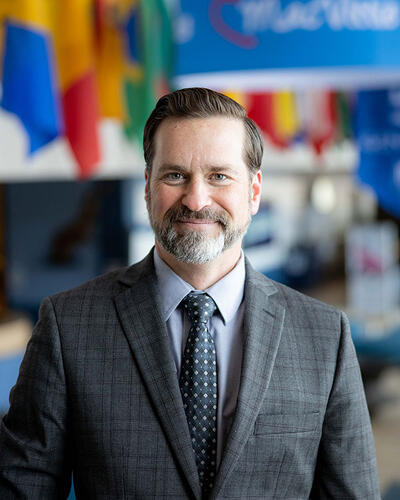Joe Cope has been a member of the Geneseo faculty since 2001, advancing to the rank of associate professor in 2007 and professor of History in 2014. In his faculty role, he taught a range of classes focusing on early modern European history and Irish Studies. His published work includes multiple articles on the British Isles in the 17th century and a monograph entitled England and the 1641 Irish Rebellion. In 2005, he received the SUNY Chancellor's Award for Excellence in Teaching.
Following a successful tenure as chair of the Department of History from 2011-2016, Joe assumed the role of director of the Center for Inquiry, Discovery and Development for two years. In that position, he played a key role in restructuring the office into the current Center for Integrative Learning.
In 2018, Joe joined the provost's office as associate provost for academic success, first on an interim basis and then as the successful candidate in a national search. In that role, he was involved in a number of projects connecting to student success, including piloting a first-year seminar for undeclared students and supporting a revision of tutor-training processes. Joe served as interim provost from July 2022 to August 2023, when his role changed to that of special assistant to the provost. He returned to his teaching position in January 2023.

Curriculum Vitae
Education
Ph.D., Pennsylvania State University
Publications
"The Irish Stroker and the King: Valentine Greatrakes, Protestant Faith Healing, and the Restoration in Ireland," Éire-Ireland, Fall/Winter 2011.
England and the 1641 Irish Rebellion (Boydell and Brewer, 2009).
Research Interests
- The British Isles
- Early Modern Europe
- Early Modern Europe
- Social and Cultural History
Awards and Honors
Chancellor's Award for Excellence in Teaching, 2005
Classes
-
HIST 445: The British Isles, 1485-1603
The reigns of the Tudor and Stuart monarchs saw sustained and deep-reaching changes in the four nations of the British Isles (England, Scotland, Ireland, and Wales). During this period, the region witnessed divisive processes of religious transformation associated with the Protestant Reformation; the emergence of a centralized and bureaucratized nation state based in London at the expense of local centers of power; English encroachments on independent or semi-independent regions of Ireland, Scotland and Wales; the beginnings of overseas expansion; and the creation of significant contributions to literature, the arts, philosophy, and the sciences. Using primary and secondary source readings, this course will explore these transformations and will assess the impact of these changes in regional and global contexts. This course is intended as a writing intensive seminar. The course work includes in-depth discussion, regular response papers, and preparation of a major research project. Preparation of the research project will require substantial preliminary work and revisions.
- IARL 188: Exp: Social Just & Community